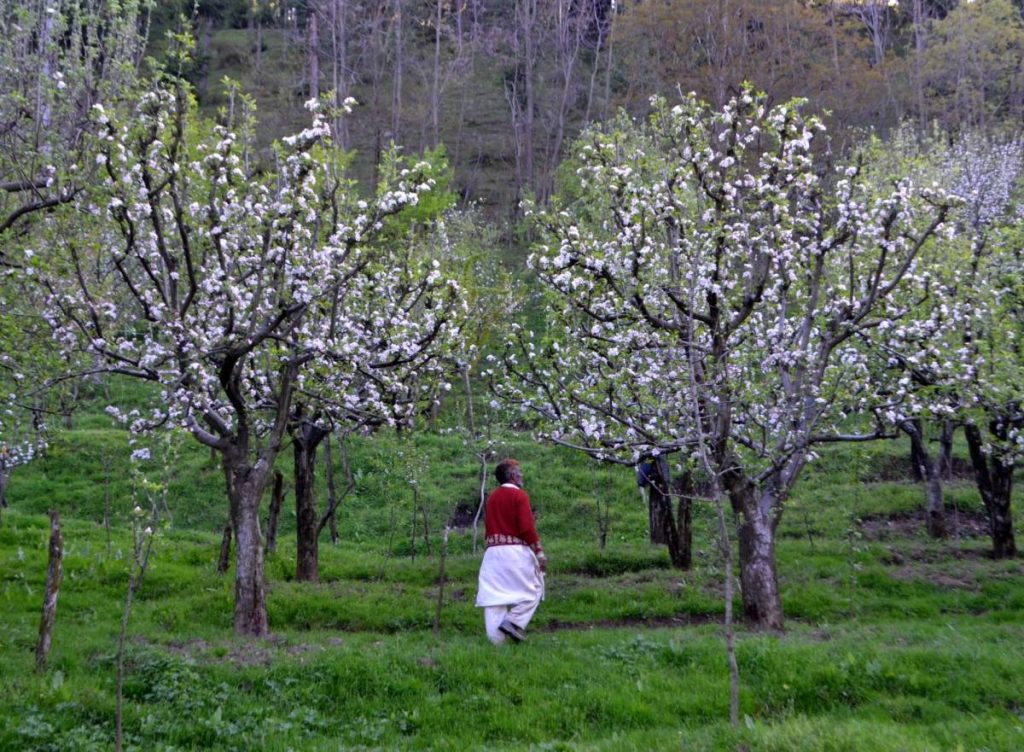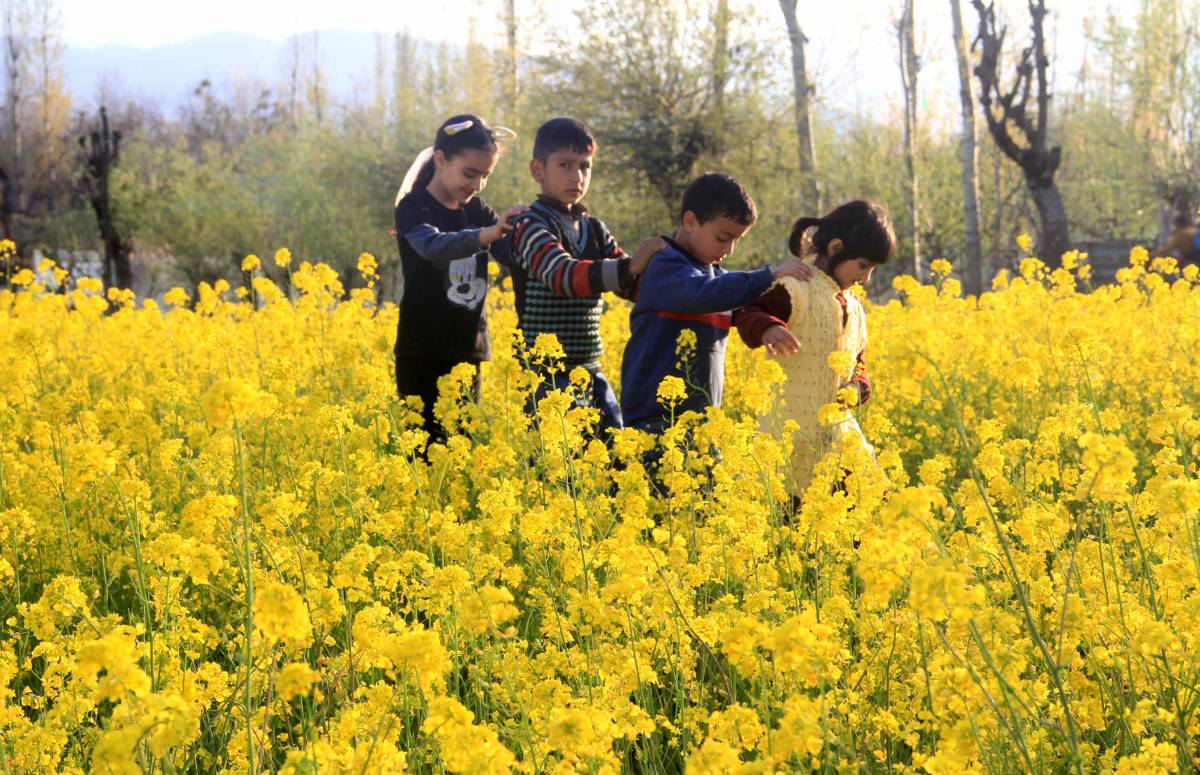Agriculture reformations have helped J&K UT to score in the top 5 states/UT in terms of monthly farming revenue. Due to market-trends-oriented farming, horticulture is now a sustainable economic activity. A special report on agriculture entrepreneurs in J&K
An impetus for the entrepreneurship culture in J&K is redirecting the collective energy toward creating marvelous works of art. One such form of art is Scientific Farming. People have started taking pride in belonging to the fertile UT of J&K. They are focusing on learning skills and self-employment – the vision of Atmanirbhar Bharat envisaged by Prime Minister Narendra Modi.

Recently Jammu and Kashmir’s Bhaderwah region made news by growing exotic Italian pears with an annual production of 1.5 metric tons. Horticulture is getting popular with farmers owing to the government’s monetary schemes and free skill development training.
Once upon a time, the villages of Bharova, Khalo, and Shanatra in Bhaderwah were poverty-stricken. Haji Mohd Shafi Sheikh,resident of a small village Bharova (18 km from Bhaderwah town), pioneered the horticulture movement when he switched to growing fruits and medicinal plants two decades back. His maize and green fodder fields were completely dependent upon rain and never yielded beyond Rs 20,000 a year. Now his Italian pears earn him a whopping Rs 25 lakhs annually.
A team of Krishi Vigyan Kendra assistance has helped 165 families from these villages to convert their lands into orchards scientifically, turning this region into an exotic fruit hub. The Red D’Anjou pears (Italian pears) have also attracted tourists, fulfilling an objective of J&K’s horticulture tourism.
On June 29 at Sher-i-Kashmir International Conference Center Srinagar a Kisan Maha Sammelan was held to recognize innovative, technologically advanced farmers for their contributions to agriculture and horticulture. Lieutenant Governor Manoj Sinha advised the youth to take up agriculture as a career as Jammu and Kashmir is gifted with nature’s bounty and the government has introduced several policies and schemes to increase farmers’ income.
The honored farmers received sanction letters and National Saffron Mission cash support. The LG also released the book “Zero Budget Natural Farming” at the event. Agri-preneurs at the event discussed with representatives from agricultural institutes the optimum methods of growing high-density food crops. Female agriculture entrepreneurs were promised all support from the UT government. Vocational training in agriculture is helping women to become self-sufficient. Today many women are choosing to grow mushrooms, lavender, and baby corn among other crops due to their high demand in mainland India.

Agriculture reformations have helped J&K UT to score in the top 5 states/UT in terms of monthly farming revenue. Due to market-trends-oriented farming, horticulture is now a sustainable economic activity.
Farmer welfare schemes sponsored by the Prime Minister such as Kissan Sammaan Nidhi, Kissan Credit Card, Kissan Fasal Bima Yojna, Soil Health Card, Pradhan Mantri Krishi Sinchayee Yojana (PMKSY), National Agriculture Market (e-NAM), SVAMITVA Yojana, etc. have helped to double the farmer’s income.
In March this year, Sher-e-Kashmir University of Agriculture Sciences and Technology (SKUAST) Srinagar, held its annual 7th Technology-cum-Seed Mela, with the theme ‘Organic and Natural Farming’. The culture of organic farming is spreading like wildfire in J&K. It relies on compost manure, green manure, and bone meal; and techniques such as crop rotation, companion planting, mixed cropping, and fostering the multiplication of insect predators. The use of naturally occurring substances over synthetic has helped in maintaining soil health in the region.
This unique event brought together the farming community including private players, NGOs, public representatives, policymakers, student technocrats, and all others involved indirectly in agriculture and allied sectors to establish new business opportunities.
Thousands of people from the length and breadth of the J&K UT and Ladakh UT attended this mega event. Orchardists, mushroom growers, vegetable growers, floriculturists, livestock rearers, poultry farmers, aqua-culturists, sericulturists, input dealers, farm machinery representatives, agriculture students, and researchers – all went home happily with at least one business prospect.
Agriculture mela and exhibitions across the UT are witnessing a heavy footfall of people. The increase in revenue is a motivating factor for self-help groups, especially for women. The melas display the latest agriculture equipment and literature about the best farming techniques for higher yield and higher profit per unit area.
Malpractices in agriculture are now under strict vigilance. The Department of Agriculture has banned the use and availability of sub-standard and spurious pesticides and insecticides. The law enforcement wing of the administration has made it mandatory for all manufacturers/distributors to get prior testing of their products at source and declare the same to the department. During the current year, 1200 quintals of sub-standard products have been seized by the department.
Today J&K is an international brand name in the category of fruits and medicinal plants. Right now, a person sitting in Dubai is enjoying Kashmiri cherries and apricots, while another in Germany is using Kashmiri lavender for aromatherapy. The improved livelihood standards of farmers in J&K today are the direct result of the Center’s efforts through schemes and programs to empower the farmers’ status to that of Agriculture Entrepreneurs.









